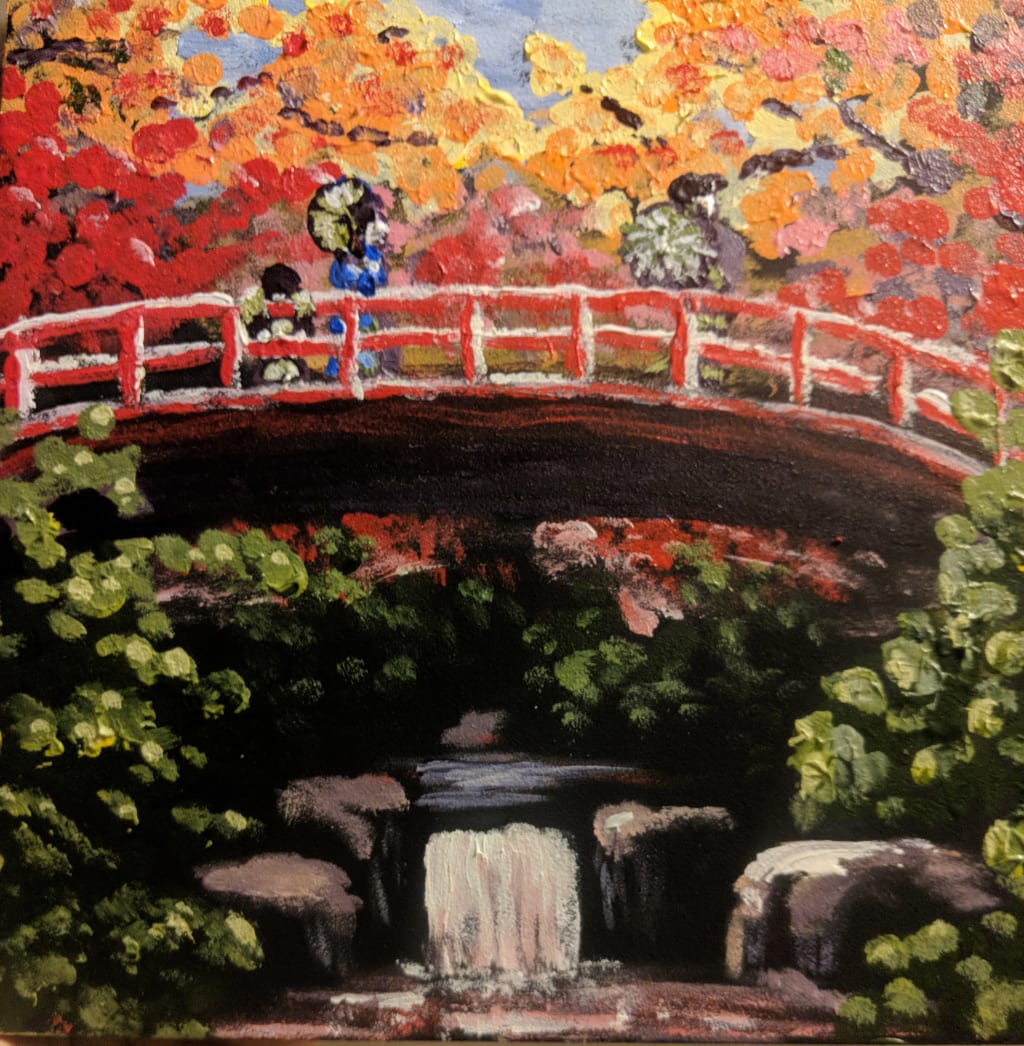Summer of the Spiders

When the Japanese cremate a dead body, they leave the bones. We learned this when we were stationed at a military base in Japan, and Mom died. She’d loved Japan so much and wanted a traditional Japanese cremation, and even though the base chaplain warned Dad that it wouldn't be like in America where they char the bones down to dust, Dad said, that’s okay. It’s the way she would have wanted it.
The funeral took place right before my eighteenth birthday and only a month after Meghan’s eighth. It began with a fairly normal service—a quick eulogy and prayers. We filed by the white casket, me holding my little sister’s hand. The casket was closed but had a glass window so we could view Mom’s gaunt but peaceful face covered with flower petals we’d sprinkled in earlier, also white. Like Snow White in her glass coffin, I thought, except a kiss, no matter how filled with love, would never bring Mom back.
We were ushered upstairs to wait while they rolled the coffin away so they could burn the body with the petals. They served us a meal; Dad and some of Mom’s Japanese friends nibbled sushi in silence while my sister and I sat like wooden dolls and stared at our plates. I tried to choke down a rice ball, but it felt like sawdust in my mouth. Meghan didn’t attempt to eat. Her glazed eyes focused at the pretty platters, her face as white as the petals they had sprinkled across Mom’s lifeless face.
Finally, they escorted us into a small chamber and rolled in the cart loaded with our mother’s bones. Meghan’s eyes fell on the skull’s crown, and she let out a heart-freezing wail. Mom used to make the same sound when something frightened her. Hitomi-san, our neighbor, grabbed Meghan’s hand and led her out of the room while Dad wobbled next to me, sweating and cursing under his breath at the sound of Meghan’s wail and the sight of his wife’s bones.
But I stared at the pieces of skull and shoulder blades and could only think: that’s not Mom. That has nothing to do with her. It’s just a pile of bones, like something you’d see in a laboratory or a museum. I put a clammy hand on Dad’s arm. He reached over and clutched it with a grip like a vise.
Hitomi-san and Meghan didn’t return. The rest of the funeral party moved ahead with the final act: transferring the bones to the ceremonial box, where they’d already packed Mom’s ashes and smaller bones. Everyone shuffled in pairs toward the cart, my dad and I in the lead. The priest handed us long, ceremonial chopsticks, which I gripped with sweaty fingers. I was so determined to do this right; to not look like an idiot in front of Mom’s Japanese friends by dropping a bone by mistake. Dad must have thought the same thing because his shaking hand suddenly became steady, and together we managed to grip one of Mom’s charred arm bones with our chopsticks and transfer it perfectly into the box.
We passed the chopsticks to the next pair of mourners, and another bone disappeared in the box. Then another, and another, as the funeral guests solemnly shuffled to the cart. Finally, the top of the skull was the only bone left. The priest placed it on the white mound like a morbid crown. He sealed the box. It was over.
We took the box home. Dad hid it on the top shelf in his closet because Meghan couldn’t stand the idea of Mom’s bones in the house. She cried all night. I crawled in bed with her and held her until the sun’s rays crept into our room.
“She’s at peace now,” I whispered, stroking her hair. “You know how much pain she was in, near the end.”
Meghan sniffled, wiped her nose, and stared at me with her solemn blue eyes. “Amy, do you think she’s happy in that box?”
I hugged her and sighed. “I don’t think she’s happy or sad, Meghan. She doesn’t feel anything. Not anymore.”
<<<>>>
That happened in April. We had a traditional American funeral at the base chapel the next week. At that funeral, Dad wore his uniform with the medals. I put on a yellow dress and Meghan a blue one that matched her eyes, because Mom had made us promise we wouldn’t wear black. People crowded into the chapel. Everyone knew everyone on a military base, and everyone liked Mom. But that funeral didn’t feel real to me, not like the Japanese ceremony had. Something about the horror of seeing my mother intact in her coffin one minute and a heap of anonymous bones on a silver utility tray the next had driven into my head that she was gone—permanently. Forever. I had gotten out my public grief then. I didn’t want to have to go through it again.
May passed in a dismal blur, and summer break began. I graduated from high school, but I barely remembered pulling on my cap and gown and walking across the auditorium stage. What I remembered, when I took my diploma and glanced into the crowd, was wan little Meghan, hunched next to Dad and staring at her shoes while Dad and the rest of the audience smiled and clapped.
It didn’t surprise me. A year ago, when they had diagnosed Mom with cancer, my normally extroverted sister began to burrow deep into a self-imposed, reclusive cocoon. I could sometimes get her to smile and giggle, but then the funeral happened and Meghan barricaded the door to her little world with a stubborn silence. She hadn’t screamed or cried since the day of the funeral; she’d simply gone quiet.
I was busy getting ready for college, which meant a move back to America in August while Dad and Meghan stayed in Japan until Dad got his next assignment. Where they would end up next, we wouldn’t know until later. Part of me couldn’t wait to escape the country that now held nothing but painful memories. I couldn’t even weep at the thought of leaving my little sister behind.
<<<>>>
The spiders in Asia get enormous. We found that out a couple of weeks after we moved to Japan. Meghan and I were in our room: Meghan lying on the floor playing with blocks and sixteen-year old me flopped on my bed, fuming because I had to share a bedroom with a six-year old. Mom and Dad had wanted to “immerse” us in Japanese culture so they had rented a traditional house in town with only two bedrooms, which meant Meghan and I were forced bunkmates.
Meghan stacked another block and said, “Amy, do you like Hitomi-san?”
I rolled my eyes. “I guess.” Hitomi-san was married to a retired Marine, and Mom had hired her to babysit Meghan after school and to teach us conversational Japanese. I didn’t mind studying Japanese, but I didn’t enjoy having to learn it with Meghan’s babysitter. Hitomi-san talked to us in a calm and patient voice, which Meghan responded to well but made me feel like an ignorant baby.
“Ohayo go-zimas,” Meghan said to her block. “Good morning. Ohio go-zimas, Amy.”
“That’s ‘ohayo goz-ai-mas’, dummy,” I said. “And it’s evening now, not morning. You should be saying ‘konbanwa’ instead.”
“I know, but I’m practicing ‘good morning’ now,” Meghan insisted.
A sudden scream pierced through the house: high and wailing and full of terror that sent my heart galloping like a frightened horse bolting toward a steep cliff. I rolled off the bed, and Meghan scrambled up, her bare feet sliding across the wooden floor. “What was that?” she whispered.
I ran into the hallway. The scream was coming from our tatami room, the traditional Japanese room covered with rice straw mats and lined with sliding paper doors. The wail was so high in pitch that, not for the first time, I thought of the way a dog yelps when it gets its tail stepped on. No human voice could hit such a high note.
But no, it was Mom. She had stumbled across the hugest spider I’d ever laid eyes on. Bigger than my fist, the spider crouched in a corner of the tatami room, its asymmetrical legs poised for an imminent attack, or so I imagined. Mom had almost crashed backwards through the tatami room’s paper walls, so intent was she in escaping this eight-legged harbinger of horror.
Meghan had followed me into the room, and when her eyes glommed onto that spider, she imitated Mom by screaming at the highest pitch her little body could produce and retreating to the safety of our bedroom. I stood, frozen with fear. If that spider had decided to jump onto my face, I’d have been powerless to move away from it.
“Get it out, get it out!” Mom yelled.
Dad rushed in, cornered the spider, and squashed it, but not after it had scuttled about, trying desperately to avoid Dad’s massive hands. Mom stumbled into the hallway, swearing that she’d never enter the tatami room again. Meghan cowered in her bed and insisted on a glaring night light from that day on.
“It was a huntsman spider,” Hitomi-san, told us when Meghan and I traipsed over to her house for our language lesson. The wrinkles around her kind eyes crinkled in amusement. “They’re big and scary, but harmless to humans. They eat the mukade.”
“The what?” Meghan said.
“The big, poisonous centipedes. They crawl into your shoes. You should be happy for the spiders.”
“Hitomi-san,” I whispered, watching Meghan’s blue eyes expand to the size of quarters, “maybe now isn’t a good time to mention poisonous centipedes.”
Hitomi-san ignored me. “If you leave the spiders alone Meghan-chan, they will leave you alone too.”
Meghan didn’t believe her. Neither did I. We trusted our mother and took our cues from her. If the spiders terrified Mom, they terrified us.
<<<>>>
The summer after Mom died, it rained and rained. The deluges fell so hard and fast even our umbrellas were useless. We spent most of our vacation indoors, morose and miserable, watching an endless torrent of water pour from the heavens. Meghan said it was Mom crying.
“She’s sad because she had to leave us,” Meghan whispered, running a finger along a fogged-up window pane. “And pretty soon, you’re going to leave us too.”
I sighed. I was short on empathy by then, impatient with Meghan’s little comments which on one level were working—I had begun to feel more and more guilt-ridden about leaving her—and on the other level were making me long for the day I’d board a plane and escape all this misery. I wished she would talk about anything but Mom. I stared at a calendar hanging on the wall. The calendar had a picture of a red torii gate. Underneath the picture, I had begun X-ing out the days until college began.
“I miss her,” Meghan whispered
“I know,” I said, hoping that would be the end of it.
“Pooky-chan misses her too.” She stared out the window, her finger spiraling through the vapor clinging to the pane.
I frowned. “Who is Pooky-chan?”
She pulled her finger away from the glass. On it, she had drawn a round circle with eight lines sticking out of it. “My pet,” she said.
She crawled to her bed, burrowed under the covers, and returned to her silent world. I sighed again and went to the living room to watch TV.
Pooky-chan turned out to be a huntsman spider about as big as my palm, which was fairly small for a huntsman but big enough to scare the hell out of any sane human being. Meghan pointed him out when I went in the bathroom to wash my hands. In our little Japanese house, the washer and dryer huddled next to the bathroom sink, and the spider crouched near the dryer vent, hoping, I assumed, that some tasty treat would wriggle out of it.
“He’s waiting for mukade,” Meghan said.
I stood, frozen in place, just like I had when Mom found the spider in the tatami room. Two years living in Japan had not helped me get used to the humungous arachnids that prowled around. “Meghan, go get Dad.”
“No,” she said. “Dad’ll smush him. He’s my pet. Hitomi-san says he isn’t poisonous. She says that I could pick up Pooky-chan, and he’d just curl up in a ball on my hand.”
“You haven’t…tried that, have you?”
“No, but I could. Anyway, he’s been there for three days now. You didn’t even notice until I pointed him out.”
I shuddered. All the times I’d been in that bathroom—taking a shower, brushing my teeth, folding laundry—and that monstrosity could have jumped on me or crawled into a shirt…
“He’ll eat the mukade if they get in the house,” Meghan insisted. “Hitomi-san said so.”
She crouched down and studied the spider. Her eyes showed no fear, not like that day two years ago when her screams had echoed Mom’s. The spider moved a hairy leg, and I scurried backwards. Meghan leaned closer.
“Look. He’s waving hello.”
“Meghan, what if that spider crawls into our bedroom? I don’t want to see that thing staring me in the face when I wake up in the morning. I’ll have a heart attack.”
“He won’t,” she said. “He likes staying by the dryer vent. He won’t hurt you, Amy. He’s not poisonous. Hitomi-san said so.”
She reached a finger toward the spider, and an involuntary whimper pushed past my lips. “Meghan, don’t….”
She smiled, the sparkles in her eyes briefly eliminating the dullness that had clouded them since Mom’s sickness and death. “He’s not scary, Amy. Pooky-chan is too cute of a name, see? Hitomi-san says that if you give something scary a cute name, you can’t be afraid of it anymore. So now I’m not afraid.”
She almost sounded happy, and tears began to multiply behind my eyelids. Why did her sudden joy in such a horrifying creature provoke a stab of sadness in me? Up until then, I had felt impatient to leave this place and start my new, adult life, even though I cringed at the thought of abandoning Meghan alone in this country with no relation except Dad, who was loving but so busy with work. It suddenly dawned on me then that our good, kind neighbor, Hitomi-san, had usurped me as the only mother-figure my little sister now had. I should have felt gladness and relief to know someone would watch over my little sister when I left. Instead, a bitterness crept into my heart. Meghan had Hitomi-san to run to when she needed comforting. She didn’t need me for that anymore.
But when I left, I would have nobody.
<<<>>>
On the day Dad drove me to the airport, Hitomi-san came with us too—Meghan’s smooth, tiny hand clutching onto her bony, gnarled one. By that time, Pooky-chan had company: Snooky-chan and Sweetums had moved into our bathroom too. Even I had gotten used to their quiet prowling. I hardly glanced at the hairy things anymore. Dad said having the spiders there was a good idea.
“Everyone says that they’re great insect hunters,” he told me. “Hitomi-san says they’ll eat the mukade, and Lord knows we don’t want any of those getting into the house.”
I laughed. He sounded so much like Meghan. “Mom would’ve never allowed it,” I said.
He hugged me and gave me a sad smile. “No. I guess she wouldn’t have.”
He had brought the box out of the closet so I could say goodbye to Mom before I left. If we had followed Japanese tradition correctly, she would have been in a cemetery by now. But Dad wasn’t willing to part with the box. He planned to fly it back to the States and bury Mom there, someday. In the meantime, she lived in the top shelf of Dad’s dark closet. I wondered if maybe sometimes the spiders crawled up onto that dark, lonely shelf to keep her company. I wondered if she would mind it, now.
<<<>>>
There’s a point in time where you find yourself in a place where you thought you’d be happy—a place with freedom and independence, far away from all your perceived troubles—but it turns into a lonely place, like a deserted island with beautiful beaches and nobody to share them with. I reached that point a few weeks into my first semester. Suddenly the shiny newness of college life turned gray and lonely. I had spent my entire existence moving from military base to military base, country to country, city to city. I was used to adjusting to new places, but the constants—the people who kept me grounded and sane—Mom, Dad, and eventually Meghan—were missing. Without them, I floundered in a sea of shadowy faces. I began to ache for the mornings when I could zoom with my sister; hear her voice, stare at her wan face.
Now she peered out at me through my cell phone. She was getting ready for bed and I was finishing breakfast in the cafeteria. Her big blue eyes blinked.
“They left,” she said.
I chewed on my last bit of raisin bagel. “Who left, Meghan?”
“The spiders. They left a couple weeks after you did.”
“I’m sorry, sis.” I shot her a cross-continental smile, trying to cheer her up. But she didn’t look as morose as she had over the summer. Color now flourished in her cheeks; her eyes sparkled with regained life. The blond hair that had hung in listless strands all summer was pulled into a cheery ponytail. She had bangs now.
“I guess there wasn’t enough hunting for them in our house,” she said. “They never did catch a mukade. So, they had to leave and hunt somewhere else. Anyway, I thought you might want to know.”
I nodded. “How’s Dad?”
“Okay. He’s waiting to hear where his next assignment will be.”
“Maybe it’ll be back east…closer to me,” I said, suddenly aware of the wild hope clinging to my words.
She shrugged. “I wish we didn’t have to move. Mom loved it here. I love it, too. I’ll miss Hitomi-san.”
“Well, that’s the life of the military brat, I guess,” I said.
She nodded, then said, “Amy, I gotta go. My friend Kari is calling.”
“Ok, Meghan. Bye. I love y…”
But she was gone. The last lump of bagel seemed to expand in my throat, threatening to choke me. I gulped some coffee as hot tears began to dribble down my cheeks. I wiped them with a quick, annoyed hand and checked to see if anyone had noticed. But I was alone at my cafeteria table, my roommate having left earlier to run to her chemistry class.
Alone. I closed my eyes and thought of Mom—Mom before she was sick—laughing, sometimes yelling, screaming in that high-pitched way when something frightened her. I thought of Dad, quiet and steady and kind. I thought of Meghan, finally beginning to emerge from her self-imposed cocoon. I had great faith that soon she’d bloom and grow, like a beautiful, golden butterfly.
I missed them all.
I even missed the spiders.
About the Creator
Nikki Bennett
I am an author of mainly middle grade and young adult novels, as well as an artist and freelance editor. I have several novels published through Firedrake Books, available on Amazon.
www.bennettcreativeservices.com





Comments
There are no comments for this story
Be the first to respond and start the conversation.